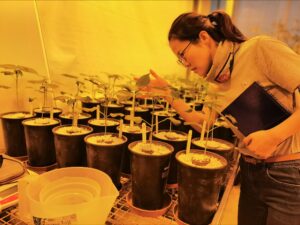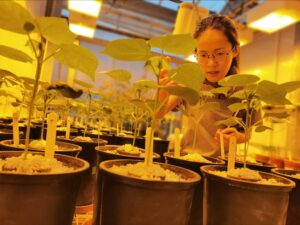Working on SHui in Lancaster as a visiting PhD student from China
My name is Yingying Ma and I’m a PhD student, studying in College of Water Resources and Architectural Engineering, Northwest A&F University (China). My research focuses on cotton responses to salinity and deficit irrigation. In China, I’ve investigated how exogenous K+/Ca2+ application during fertigation enhances cotton tolerance to salt stress under different irrigation regimes. This research aims to provide useful information to better manage irrigation and fertilization to guarantee fibre yield in future water-limited and salinity-affected soil environments.
In August, 2020, I was awarded China Scholarship Council (www.csc.edu.cn) funding to sponsor one year of my studies at Lancaster University, UK. After vaccination, I was able to join the group in June 2021. My research here examines cotton responses to drought stress under various irrigation regimes, in aiming to determine fundamental mechanisms of how plant roots sense and translocate drought signals to the shoot to regulate leaf stomatal behavior and reduce luxury transpiration.



Images show Yingying Ma evaluating the split-root cotton plants to establish PRD experiments
Previously, Chinese researchers now working in the SHui consortium established that partial rootzone drying (PRD) induced favourable agronomic responses in cotton such as increased yields during the early harvests of the crop, which produced higher quality fibres for a better price (Tang et al. 2005). Although PRD caused greater stomatal closure than conventional irrigation when 30% less water was applied, more recent work by SHui researchers showed no effect of heterogenous salinity (analogous to PRD) on tomato canopy-level physiological response. Thus my research will use a whole plant gas exchange system (Jauregui et al. 2018) available at Lancaster to measure cotton seedling responses to deficit irrigation, to understand whether these techniques can be used to improve water use efficiency to sustain cotton production in a future water-limited areas of Europe and China.
Since arriving in Lancaster, I’ve met many fellow researchers and with their help learned to use instruments (e.g. Scholander pressure chamber to collect xylem sap) that I found difficult to use in China. I was able to attend the Delta-T training workshop to learn how to best use the porometer and various probes to measure stomatal conductance and soil moisture. Thanks to everyone’s generous help, I’ve learned many methods to help my current research and data analysis which have made my research more efficient. I am very grateful to Prof Ian Dodd as my host, and the Chinese Scholarship Council and SHui project supporting me at the Lancaster Environment Centre.

0 comments